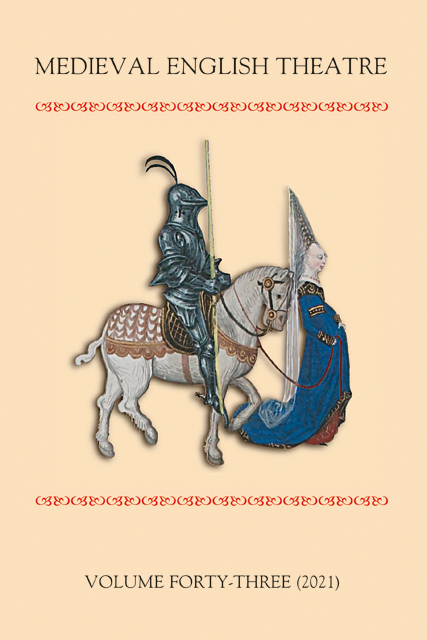Book contents
- Frontmatter
- Contents
- List of Illustrations
- Note on Cover image and Online Links
- List of Common Abbreviations
- Editorial
- The Prince of Peace and the Mummers: Richard II and the Londoners’ Visit of 1376/1377
- Chivalric Entertainment at the Court of Henry IV: The Jousting Letters of 1401
- ‘Maskerye claythis’ for James VI and Anna of Denmark
- Peers and Performers in the Reign of Henry VI
- ‘That Gam Me Thoght Was Good!’: Structuring Games into Medieval English Plays
- Feminism, Theatre, and Historical Fiction: Anna of Cleves in 2021
- Appendix Transcription and Translation of BL MS Cotton Nero D II fols 260v–262r
- Editorial Board
- Submission of Articles
‘That Gam Me Thoght Was Good!’: Structuring Games into Medieval English Plays
Published online by Cambridge University Press: 20 December 2023
- Frontmatter
- Contents
- List of Illustrations
- Note on Cover image and Online Links
- List of Common Abbreviations
- Editorial
- The Prince of Peace and the Mummers: Richard II and the Londoners’ Visit of 1376/1377
- Chivalric Entertainment at the Court of Henry IV: The Jousting Letters of 1401
- ‘Maskerye claythis’ for James VI and Anna of Denmark
- Peers and Performers in the Reign of Henry VI
- ‘That Gam Me Thoght Was Good!’: Structuring Games into Medieval English Plays
- Feminism, Theatre, and Historical Fiction: Anna of Cleves in 2021
- Appendix Transcription and Translation of BL MS Cotton Nero D II fols 260v–262r
- Editorial Board
- Submission of Articles
Summary
It is well known to medieval theatre scholars that the medieval word game was used, in one of its senses, somewhat interchangeably with the medieval term play. There is considerable evidence of the interchangeability of these terms in the prologues and epilogues of plays, where the terms of reference for the presentation are established and reinforced. Additionally, in the synonymous relationship between game and play there are many references to ‘game players’, ‘game places’, and ‘game books’.
However, even though some (theatrical) plays are recorded as games, the word game predominantly, both in the Middle Ages and today, possesses non-theatrical meanings, which determine the focus of this work. In this article I propose to examine the structural relationship between games that are ostensibly non-theatrical, and their absorption into fifteenth- and sixteenth-century English plays. Thus, following the modern practice, I shall refer to theatrical plays as plays and non-theatrical games as games.
The word game has most frequently referred to non-theatrical activities conducted by both adults and children. The activity termed play, when formalized as theatre, requires onlookers. Games, however, do not normally require external witnesses, although they may have them, and participants in games may, at times, also be spectators. This may be because of the nature of the game, that individuals are ‘counted out’ for whatever reason (usually concerned with the purpose and structure of the game); or they may deliberately ‘opt out’ as permitted by the rules of the game. Thus, they become observers within the game rather than participants in it. Similarly, personages in plays, depending on theatrical intentions and presentational conventions, may be required to withdraw, retire, or leave the action of the play and, like participants in games, stand around as observers of the action. This practice and resulting convention is accepted by personages and spectators alike.
I have written elsewhere of the necessity for theatre to engage in the process of ‘agreed pretence’: that is, a voluntary agreement between the instigators of the theatre and its witnesses to the effect that an activity called theatre is about to be played. Such an agreement is generally a tacit one established by those who put on the play and confirmed by the continued voluntary contribution of the spectators. All concerned agree that the pretence should take place and the witnesses volunteer their engagement
- Type
- Chapter
- Information
- Medieval English Theatre , pp. 191 - 223Publisher: Boydell & BrewerPrint publication year: 2022

